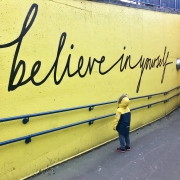Written by Ashley Vaden, LMFT
It’s a basic human need to feel connected to others, and more importantly, connected to ourselves. The fact is, we are all in this together, and we share much more in common than we realize. Everyone knows what it feels like to be alone, or have your mental health rocked in a time of confusion or uncertainty. Here’s how to make the most of it:
Get creative.
There are a lot of posts/messages on social media about making this a productive time; to really buckle down and tackle projects that you haven’t had time for, read that book you’ve always wanted to read, and start that hobby that has always felt like a distant dream. The truth is, it’s great to get stuff done and “be productive,” but because this is a difficult time, we might be placing a little bit too much pressure on ourselves to “be our best selves” and “live the life you’ve always imagined.” While we are not advocating that you neglect our responsibilities, shun your school work, and stay in our pjs all day (although, we’re not against it), we are saying that instead of framing your quantity of work to equal a successful day, why don’t you give yourself he chance to be creative?
Is there any creative endeavor you’ve wanted to research, learn about, or even try? This is the time to go for it. Not only will you be more present because you’re learning something new, it adds an extra built in layer of meaning to your day that doesn’t have to come from getting stuff done. You are more than a number; use your imagination. Connect with your sense of wonder, your curiosity, your passion, your interests. Ask yourself, “what inspires me?” and run with it.
We know the words “mindfulness” or “meditation” may make your eyes glaze over.
But hear us out! Just 30 minutes of self-compassion a day has shown to make a positive impact on mood and increased happiness (Desmond, 2017). Doing this practice may add some much needed structure to your day and help to cultivate joy. A lot of people think that if they just focus on the future and the fact that one day the quarantine will be over, as soon as that day comes, they will be so happy! Full of energy! Thankful, blessed! However, our happiness doesn’t always work that way.
Most of the time, our happiness is kind of programmed to stay at a certain level, and if we aren’t intentional about smelling the roses and thinking about what we’re thankful for, even just in the current moment, then our happiness levels tend to drop and may take a while to comeback up. Kind of like if you don’t go to the gym for a while you can get out of shape. If you are intentionally working toward being positive during this time, you’re much more likely to be able to bounce right back when this is but a distant nightmare.
-
Take a few minutes to focus on your breath. Try taking 5 deep breaths, slowly in and out, and notice how your breath feels in your nose, and in your throat.
-
Focus on feeling thankful for breath. Focus on breathing in positivity and joy, and breathing out anything that is negative and does not serve your body or mind.
-
Identify and locate any positive sensations, thoughts, or feelings in your body, and imagine these growing, almost like a flower blooming. Welcome them to become as big as they want or even to stay the same.
-
Take a minute to write down what you noticed in the exercise and 3 things you are thankful for that day.
Volunteer and reach out.
If you’re catching yourself complaining, know that it’s ok, and that you can offset it by reaching out to someone or helping someone. We aren’t here to compare pain, or feel sorry for ourselves and others; we’re in this together, and there is always someone out there who maybe has it a little or a lot harder.
That’s not said to bring on feelings of shame, but more to make you aware that you can help someone in this time. There is a problem out there and all it needs is someone to care enough to fix it. If you’re naturally inclined to want to be around people and connect with them, find out how you can become involved in community efforts to make an impact. Your generation has so much to contribute that you may not even be aware of! This is an opportunity for you to notice a deficit and bring light to it with your natural talents, gifts, abilities, and interests.
Social distancing doesn’t have to mean social neglect; organize a Go Fund me with your friends, or even reach out to someone that you’ve been meaning to check on. This could be a great time to build relationships. Maybe someone that you’ve always wanted to know more about is feeling lonely at this time too; wouldn’t it be a great opportunity to connect or find out more about someone that you may not have had the opportunity to in the past? What if they are wanting to talk to someone just as much as you are?












